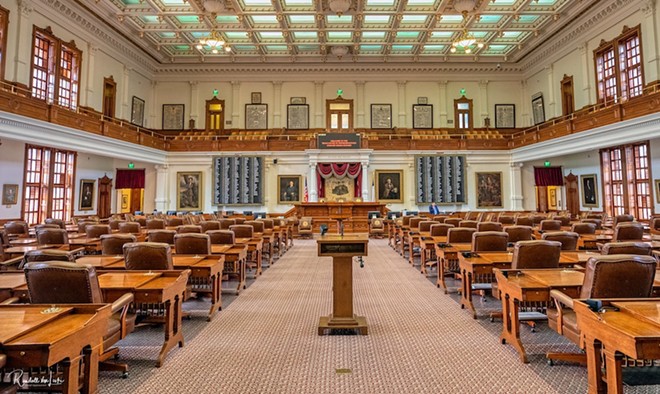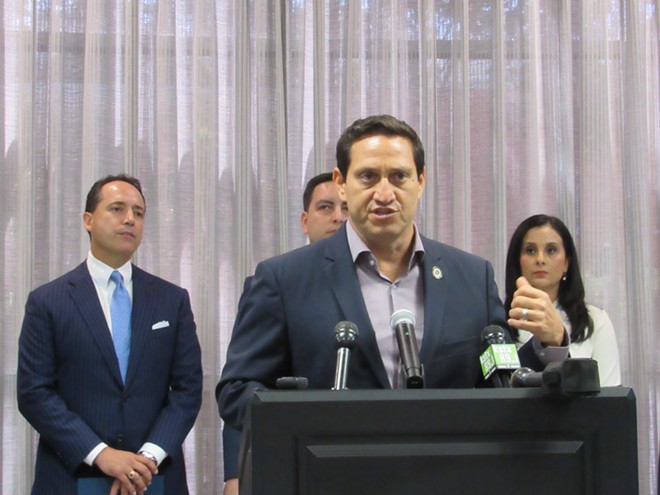
Flickr / Randy von Liski
Democrats will likely need to flip at least three Texas House seats to stand in the way of school voucher legislation.
This article was originally published by the Texas Observer, a nonprofit investigative news outlet and magazine. Sign up for their weekly newsletter, or follow them on Facebook and X.
In the last presidential election cycle, four distant years ago, Texas Democrats pursued an ambitious campaign to take control of the state House. Bolstered by millions of dollars that flooded in from the national party apparatus, Dems targeted as many as 22 GOP-held seats across the Texas suburbs. The strategy was built upon Beto O’Rourke’s near-victorious U.S. Senate campaign in 2018, in which he carried a narrow majority of the state’s 154 state House districts.
All they needed to do was flip nine seats that O’Rourke had carried. Democrats were so optimistic heading into Election Day 2020 that multiple state reps, having suffered in the minority for years, announced bids for the speakership in anticipation of their party taking control of the lower chamber for the first time in nearly 20 years. With the potency of the GOP’s gerrymandered maps having waned, and the next round of redistricting on the horizon, it was now or (possibly) never.
What happened instead was, of course, a failure of disastrous proportions as Democrats failed to net a single seat. Then, a few months later in the 2021 legislative session, Republicans redrew the state’s political maps to extend their single-party control of the statehouse for another decade. Their gerrymandering this time opted for maximum protection of their current majority of red seats. Without fear of electoral backlash, the GOP-controlled House and Senate has marched a long line of extreme conservative legislation into law.
Now, humbled Texas Democrats have set their sights lower, proceeding with cautious optimism rather than the hubris that consumed them in 2020.
“We’re gonna pick up seats regardless,” San Antonio state Representative Trey Martinez Fischer, who chairs the House Democratic Caucus, told the Texas Observer. “It could be anywhere between two seats and up to seven seats and beyond.”

Rhyma Casttillo
State Rep. Trey Martinez Fischer speaks during a news conference in San Antonio.
The precise number of flipped seats will matter. After a coalition of Democrats and rural Republicans in the House scuttled Governor Greg Abbott’s cherished school voucher scheme last session, the governor went on the warpath in this year’s GOP primaries. Abbott successfully ousted enough of the rural Republican incumbents who had the audacity to vote against his top legislative priority to strike a likely fatal blow to the bipartisan anti-voucher coalition. To spoil Abbott’s presumptive pro-voucher majority, Dems likely need to flip at least three House seats on November 5.
Democrats hope to compensate for the vanquished ranks of anti-voucher Republicans themselves with a message centered on Abbott’s decision to hold public school funding hostage until he gets his way on school privatization.
With carefully gerrymandered districts drawn to bubble-wrap a comfortable Republican majority, the landscape is difficult for Democrats. But there’s hope that a renewed surge of enthusiasm behind the party’s presidential nominee, Vice President Kamala Harris, and to a lesser extent the race between Colin Allred and U.S. Senator Ted Cruz, will trickle down to benefit Dems further down-ballot.
The effect that the Harris-Walz ticket will have on turnout in Texas is “the unknown factor,” Martinez Fischer said—which could be the difference between Dems snagging as few as two seats or riding a more substantial wave.
“I would characterize this as a wait-and-see attitude. Texas Democrats are waiting for something to happen,” said Brandon Rottinghaus, a political science professor at the University of Houston. “That’s a risky proposition because it means there’s not a lot of proactive effort to unify and push for bigger goals.
At the top of the Democratic target list are the only two Republican districts that Biden won in 2020. That begins is the 118th district in south San Antonio, which was a long-held Democratic seat that the party let slip away when Republican John Lujan narrowly won it in a special election in 2021. Biden narrowly carried the district in 2020, as did O’Rourke in his 2022 gubernatorial run.
The other is the 37th, a border district in Cameron County that Republicans redrew in their favor as longtime Democratic Representative Eddie Lucio III announced his retirement. Democrats put comparatively little effort into holding the open seat in 2022 while a surge of money propelled Republican Janie Lopez to an almost 4-point victory. Now, it’s effectively a must-win race for Democrats as Jonathan Gracia vies to wrest back the seat before the first-term incumbent becomes more entrenched.
From there, the political terrain for Democrats gets increasingly difficult. There are the sole remaining Republican legislators in Dallas County, Angie Chen Button and Morgan Meyer, who have hung on to their districts—which are home to a sizeable anti-Trump Republican electorate—despite Democrats’ repeated attempts to oust them.
Then, there’s a seat in San Antonio’s affluent Alamo Heights, once held by moderate Republican Speaker Joe Straus. While it’s a more solidly Republican district, Martinez Fischer said a “perfect storm” has created favorable conditions for Democrats. The incumbent Steve Allison, also a moderate Republican, was ousted by an Abbott-backed primary challenger, Marc LaHood, in March who is seen as a right-winger out of step with the district’s more establishment Republican voters.
At the same time, Democrats will have to play defense in a few districts to avoid seeing their hoped-for victories canceled out. Mihaela Pleasa, a first-term legislator from Plano who very narrowly won her seat in 2022. And perhaps the GOP’s top target is the 80th, a large rural district centered in Uvalde held for years by conservative Democrat Tracy King, the last remaining rural white Democrat in the Lege. With King retiring, Republican Don McLaughlin, the former Uvalde mayor, is favored to win the race against a Laredoan Democrat, whose home was recently raided as part of a Ken Paxton-led voter fraud probe.
Unlike in 2020, the national Democratic party is not focused this year on sending resources and money for down-ballot legislative campaigns in places like Texas.
“What’s driving this in part is you’ve got a bunch of nationally competitive Senate races sucking up money and Harris reinvigorating Democrats nationwide, so a lot of the focus is flowing that way,” said Rottinghaus. “That leaves lots of Dems statewide and down-ballot candidates without a chair when the music stops.”
Martinez-Fischer said he’s confident House Democrats, along with the state party and allied groups, will have enough money and troops to cover the bases. “I think that [in] every single campaign that we’re focused on, we have a very certain determination of what needs and resources are.”
Last month,he and other top Dems hosted a campaign rally with the Second Gentleman Doug Emhoff in San Antonio. That was followed by a private fundraiser that reportedly brought in $1 million, which Emhoff claimed was the largest for a presidential hopeful in the city’s political history.
Rottinghaus projects that Democrats will have to scrape and claw just to win a couple seats. “It’s a Republican inertia year. There are not significant enough changes among electoral coalitions or money spent to pick up a sizable amount of seats.”
While there’s sure to be an uptick in routine speculation about a blue wave in Texas as election day nears, you certainly won’t see any Democrats measuring the drapes in the House Speaker’s office.
Subscribe to SA Current newsletters.
Follow us: Apple News | Google News | NewsBreak | Reddit | Instagram | Facebook | Twitter| Or sign up for our RSS Feed